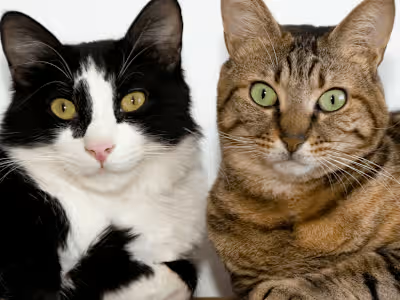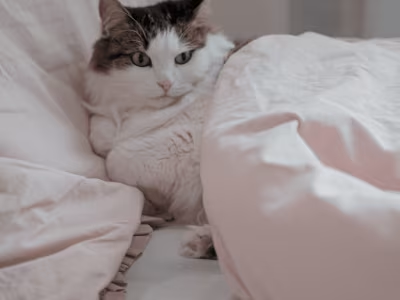Blog: 10 things you need to know if your cat is getting old
10 things you need to know if your cat is getting old
There aren't many things more heartbreaking than watching your beloved pet grow old. The fact that they can't be as active as they once were, and the fear that their health might be declining, can be incredibly stressful. But the good news is that there are some things you can do to make the end of their life less stressful for them (and for you). Here are some tips to help you care for your aging cat.
Is my cat considered a "senior cat"?
As a general rule of thumb, cats are classified according to their age: mature (7 to 10 years), senior (11 to 14 years), and geriatric (15 years or more). Cat's aging should be viewed as being on a continuum because the aging process differs for individual cats based on factors such as their size and environment. Often times, lifestyle and health modifications begin during the mature classification and evolve based on the individual cat's needs. For example, a senior cat who has the same needs as a mature cat might require a different level of care since their age has taken its toll.
The effects of aging
As cats age, their physiological changes often include reductions in their ability to smell and taste food, digest fat and protein, hear, see, and feel the pain of injury. Some of these changes are irreversible and can lead to serious health problems, such as decreased ability to smell and taste food, reduced ability to digest fat and protein, reduced hearing, immune function and vision loss. For example, cats with diminished hearing may start to meow louder than usual since they can’t hear themselves and adjust their volume appropriately. And some older cats may groom themselves too much, resulting in bald patches and irritated skin.
Take note of behavioral changes
Your cat may just be going through the natural aging process, but it’s possible that there are underlying health issues that are causing behavioral changes. In addition to personality changes, your cat may also start exhibiting new behaviors. For instance, he might start peeing outside the litterbox. Other behavioral changes can be seen as a direct result of disease, for example, increased thirst or appetite or aggression associated with pain. If you notice any changes in your cat’s behavior, it’s important to get them checked out by a veterinarian.
Observe weight changes
Weight loss is a common symptom in many health conditions, including diabetes, hyperthyroidism, kidney disease, and gastrointestinal cancers. In some cases, weight loss can be the result of dietary changes, such as a reduction of the amount of food intake by a cat with dental disease. But even healthy cats can experience gradual changes in weight, which can be hard to notice. Monitoring your cat’s weight is one of the best ways to monitor her health.
Pay attention to signs of pain
Arthritis is a common problem in cats. Estimates say that approximately 40-92% of cats have pain associated with arthritis. Signs of arthritis include painful joints and mobility issues. For instance, you may notice your cat has trouble going up and down the stairs or jumping up to her favorite high perches or napping spots. Arthritis can also limit a cat’s activities and range of motion. If your cat is experiencing any of the following signs, it may be time to seek veterinary care: difficulty getting up; reluctance to move; limping or favoring one leg; difficulties with balancing; and poor appetite or weight loss.
Keep your home "senior cat friendly"
As cats grow older, they often need extra padding and warmth for comfort. Soft bedding, raised food and water bowls, and ramps (sloped surfaces) can make it easier for your cat to access these items. Older cats may find it more difficult to maintain their own cleanliness, so it is important to regularly check them. Cats need uninterrupted rest, so any favored areas should be accessible and new ones created if lack of mobility prevents your cat from using those previously favored. Providing raised food and water bowls and soft bedding at favored sleeping and resting spots will make life easier for both you and your old cat.
Feed your senior cat the right way
When it comes to feeding your cat, there are a few things to keep in mind. First, always make sure they have easy access to food and water. Second, senior cats may prefer wide and low-sided bowls. Talk to your veterinarian about when the best time to transition your cat to senior food is, as they will be able to assess your cat's optimum weight and recommend the best diet. Additionally, it can be helpful to feed senior cats small, frequent meals throughout the day, and increase your cat's water intake by providing canned food and more options for drinking water. Always offer food at room temperature, and soft food or dry biscuits will be good for cats with digestive problems.
Your cat's toilet habit
Litter trays should normally be located well away from other resources, such as food and water, but for the very elderly or those cats suffering from cognitive dysfunction, it is appropriate for all their resources to be located in easy reach to avoid confusion. Open litter boxes with low sides are ideal and they should be firmly fixed to prevent them from being tipped up if your cat is clumsy when using a tray. If the amount of urine in the litter box has changed, even small changes in or around the litter box should prompt a call to your cat’s veterinarian as they could be indicators of serious underlying disease.
Keeping your cat mentally and physically stimulated
As your cat ages, it may become more difficult to provide the same level of physical and mental stimulation that she enjoyed as a kitten. All cats need places to climb, hide, scratch, and hunt, but as your cat ages, providing these things may require some extra thought. For instance, if your cat is no longer able to jump high enough to get at a toy on a shelf, you might have to let her play with the toy on the floor instead. If your cat can no longer jump onto cabinets, you might have to provide a climbing structure such as a scratching post or a tree. Providing things for your cat to do helps keep her mentally and physically stimulated and healthy. However, as your cat ages, you may want to be especially mindful of her health and well-being as she may not be as capable as she once was, but regular exercises are still encouraged.
Regular health checkup is essential
It is essential for older cats to have regular health checkups with their veterinarian, even if they seem healthy. Blood work done during these visits can detect the onset of health issues like kidney disease while there’s still time to make medical changes that will improve and extend your cat’s life. Apart from what has been mentioned above, other signs that require special attention from your veterinarian include loss of appetite, drinking more often or drinking a larger amount per day, stiffness, lameness, lumps or bumps anywhere on the body, balancing problems, difficulty passing urine or feces, disorientation or behavior such as hiding, aggression, excessive vocalization. Make sure your cat is also being checked regularly for reddening of the gums or other evidence of dental disease.
It could be frustrating to deal with senior cats at times, but with the right care and patience, senior cats can live a long and healthy life. We hope that you have enjoyed our article and that you have a better understanding of what it takes to keep your elderly cat healthy.
Like this project
Posted Feb 19, 2023
The purpose of this article is to give cat owners helpful tips and information on how to take care of their aging feline friends.
Likes
0
Views
5




